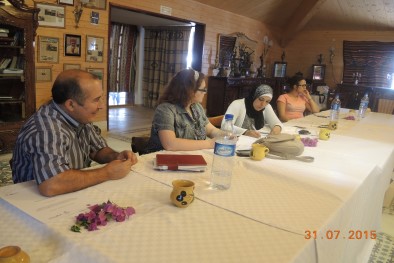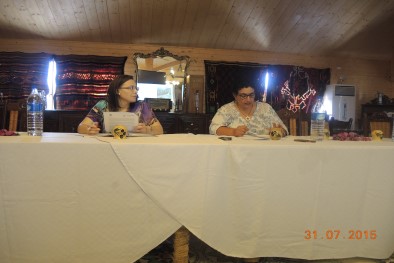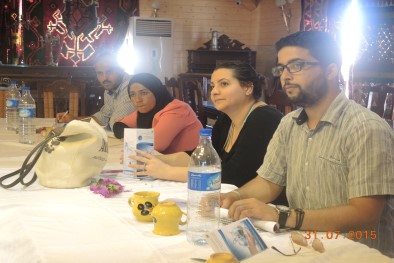In the lead-up to the United Nations Climate Change Conference COP21, to take place in Paris, France, in December 2015, where governments are supposed to reach a universal agreement on climate critical for the planet’s future, the Global Water Partnership (GWP) and the Office Franco-Québécois pour la Jeunesse (OFQJ) have joined forces, with the support of the French Ministry of Foreign Affairs, in the project "La Jeunesse Francophone pour l'eau" [Francophone Youth for Water], aimed at mobilizing youth in nine francophone countries on water resources management and climate change adaptation.
Young water experts from Belgium, Benin, Burkina Faso, Cameroun, Canada/Québec, France, Haiti, Togo and Tunisia are currently engaged in national consultations organized by GWP Regional/Country Water Partnerships on the youth’s role in the management of water resources under climate change stress, which will result to a youth-led white paper on the topic that will be presented to decision-makers at COP21. Launched on 13 April 2015 at the 7th World Water Forum in South Korea, the project is also supported by the International Organization of la Francophonie, the International Water Secretariat and the World Youth Parliament for Water.

In Tunisia, the project is implemented by the Global Water Partnership – Mediterranean (GWP-Med), which has taken the decision to conduct the Tunisian national consultation at the Rmel river basin level, establishing a close synergy with the European Commission’s BeWater Project. In the framework of BeWater Project, which promotes dialogue and collaboration between science and society for sustainable water management and adaptation to the impacts of global change in the Mediterranean at river basin level, GWP-Med is responsible for running the river basin level awareness raising campaign. One of the BeWater’s 4 Case Studies River Basins is in fact Rmel, which makes the synergy between the two projects a choice with great added value.
Following three months of desk research analysis to establish an understanding on the status of the Tunisian youth participation in water management, youth stakeholder mapping, preparation of the appropriate questionnaire and bilateral interviews based on that, data analysis and evaluation, GWP-Med held a national workshop on July 31st, 2015 in the governorate of Zaghouan, under the thematic “Boundaries and guidelines for a committed and active involvement of youth in sustainable water resources management and the fight against climate change”, with stakeholders from public institutions, civil society, universities, and media at both national and local level, in order to get their feedback on the matter and validate the data accumulated.
The workshop focused on the identification of limits faced by youth to fully and efficiently be part of the decision-making process on the one hand, and the development of recommendations to address the challenges previously identified, on the other hand: Given the gap of collaboration between the central and regional administration, public institutions and civil society or within civil society itself, limitations to the access to information or to the knowledge transmission owed to a generation gap restricting the NGOs’ capacity in resilient water management, there is a lack of sustainability in the NGOs’ actions, which facilitates the enhancement of a top-down approach in decision-making and hampers the civil society’s involvement in the planning process. Suggested strategic measures for a stronger youth engagement in water resources management and climate change adaptation, in response to the above-mentioned challenges, include the importance of having access to information via internet, especially documents related to public politics and national strategies, and the necessity to enhance and reinforce youth NGOs’ capacities, in parallel to awareness raising activities.

In an enthusiastic and creative atmosphere, participants concluded to an unanimously accepted action plan, including a) organizing communication and awareness-raising activities aimed at civil society, b) running a capacity building program addressed to youth NGOs at local level, c) promoting the organization of a youth network at local level, and d) enhancing the beneficiary NGOs’ participation within the BeWater Project. For this last reason, and in order to reinforce the activity’s future sustainability, a workshop participant has been selected to represent the project “la jeunesse francophone pour l’eau” within the future BeWater Project proceedings, while two youth BeWater representatives will be selected as Tunisia’s representatives within the project “la jeunesse francophone pour l’eau”, to visit COP21 in Paris, along youth representatives from the project’s other eight countries.
The recommendations from the national workshop will be integrated into GWP-Med’s final report which is currently prepared, as the Tunisian contribution to the project’s white book, to be presented to decision-makers in COP21 in December 2015.
GWP-Med also presented this work with the Tunisian youth at MEDCOP21 in Marseille, a meeting of Mediterranean stakeholders initiated by the Center for Mediterranean Integration (CMI) to support the Mediterranean Region’s agenda towards the COP21, in order to strengthen the stakeholders’ engagement in the fight against climate change and demonstrate their contributions. Within MEDCOP21, GWP-Med participated on 4 June 2015 to panel “Young people, Climate Change and solutions”. There is a video, as well as photos available from the event. GWP-Med also presented its youth work at the Universal Expo Milano 2015, where more than 150 pavilions are built by the participants to expose their solutions to attend food security and hundreds of side events are organized dealing with food and water security, agriculture, adaptation to climate change etc. The GWP-Med representative, along five more youth representatives from other francophone project countries, was a guest speaker at an event organized by the French Rhône-Alpes Region on “Piémont Agriculture toward Climate change: management model for water in agriculture” on the 5th of June.
